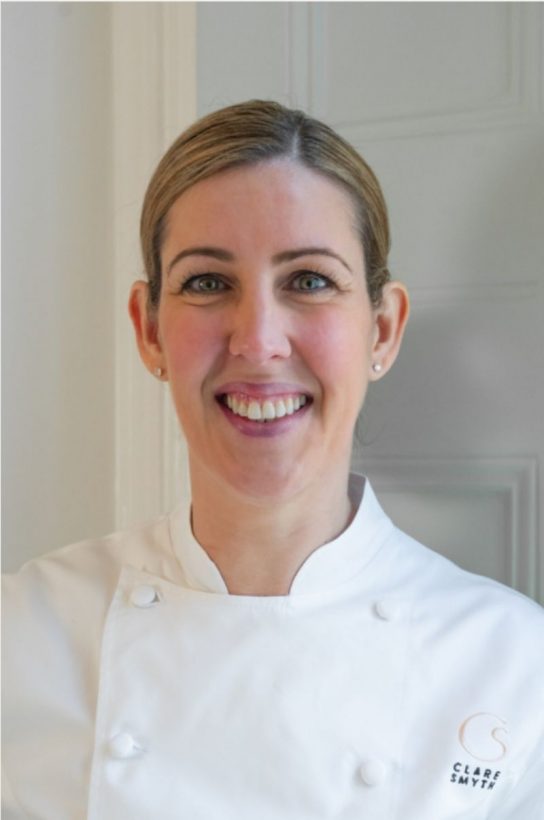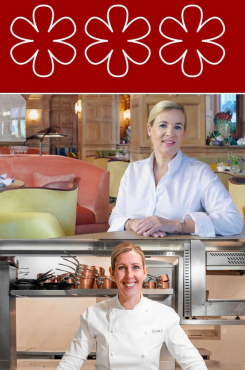In conversation with… Clare Smyth
Published 26 January 2021

Core by Clare Smyth was awarded the rare accolade of three Michelin stars at last night’s Michelin awards for 2021. Here, we revisit our interview from 2018, when Smyth won The World’s Best Female Chef.
From retaining three Michelin stars for years to cooking at the royal wedding to winning – this year – The World’s Best Female chef, Clare Smyth is a role model to everyone in the industry. Over lunch at her restaurant Core to celebrate her latest accolade, she tells Lisa Markwell what really matters to her
Michelin stars, rave reviews, global awards, how do you measure your success?
For me that’s quite an easy answer, it’s the guests. Since I’ve opened Core I’ve grown up, I’ve matured and that’s what has really stood out the most. The people supporting you, the voice of the people, it’s the most important thing. When we opened, we didn’t have any accolades at all, we had nothing, but people came, they ate, they gave us great comments, and they brought their friends. So many old regulars that I’ve known for many, many years supported me. They’ve come back and now we also have new regulars – people from the area who come time and time again. Nearly every day the restaurant is often half full of people we know and for me that’s the most powerful response.
I call it the “enjoyability factor” and you can’t grade that with anything, Michelin stars, or five-star reviews. Ultimately if people have a good time in your restaurant they are going to come back – you’re going to be busy and full regardless of any criteria. People might go to restaurants with great reviews, with Michelin stars, and they might not have enjoyed themselves.
So would you say that things have changed from the days when restaurant critics were the makers and breakers of restaurants? That these days it’s the social media ‘critics’ and the public that are more influential?
I think that there is a place for everything – all guides and critics. But the voice of the people, the power of their voices, is a good thing. I think that’s really healthy – because it’s about the relationship you form with your customer.
There’s such a volume of people posting reviews you can see generally if a restaurant is highly regarded by the people who come in with their friends, their family, or if it’s their birthday, whatever… They might be foodies, not foodies, all sorts of people – it takes a lot of people to fill a restaurant every day and generally, here, people are having a good time… and that’s powerful.
I like the term ‘enjoyability factor’. It feels as if you’re taking away the fussiness of fine dining – which enables people to feel that although it might be special, it’s not reserved only for special occasions.
I wanted to take away the thing that put people off, whether that was an intimidating or uncomfortable impression – a lot of people don’t like going into a stuffy atmosphere. We’re talking about people from all walks of life, so it doesn’t matter your age, your experience in dining, your wealth… anything.
For me it’s that informal luxury, you don’t have to be stiff to have a good time. The food can be just as good, the service just as good, the product just as good … but people can laugh, feel at home and ultimately that’s what I wanted to create. I wanted to take away all the pretentiousness, the nonsense – because I don’t like that when I go out. I’ve gone to restaurants and travelled to go there and people are there dictating to you how to eat and all of that.
I wanted to say ‘this is my home, share it with me’. That’s why we knocked down the wall, got rid of all the barriers, introduced the cooks to the people, the producers who we work with, create those relationships so people can enjoy the whole experience.
Would you say London is leading the way with this more informal luxury vibe?
London is definitely at the forefront of that movement … but a place I always think is very progressive is California, San Francisco – particularly with the dining scene. There are three-star Michelin restaurants there – there are no dress codes, there are no tablecloths, but the quality is unquestionable. It even comes through more because when people are really knowledgeable, really passionate, and really great at what they do they don’t need to hide behind all of that formality – those are barriers between you and the guest.
Things like hard-to-decipher menus and pompous sommeliers, for instance…?
Those are exactly the things that I’m really passionate about not happening in Core; those are the rules we set down. I’m a diner in restaurants too, like all of us and we’ve all experienced the same things – but that can’t happen in my restaurant, I don’t want that to happen. Particularly with wine and with food names – what is it, how do you pronounce it – why should that be a barrier?
I want to write the menu in a simple form and people should just feel comfortable enough to ask the sommelier. They should be there just to enrich the guest’s experience. People are doctors, lawyers, nurses, whatever, and when they come to a restaurant they’re there to enjoy it – and we’re there to entertain them.
It’s brilliant that you have been recognised as the elit Vodka World’s Best Female Chef 2018, but the separate criteria for women has created some dialogue about whether that’s a good or bad thing. What’s your view?
It just depends how you look at it. This is not a gender specific role – and I earned my stripes in the kitchen the same as everyone else – but you cannot ignore the fact that there are not enough women represented at the top of the industry. When I was told about this award I discussed it with the organisers, and they said it’s up to you how you use the platform. They were very good about it – basically they recognise that there aren’t enough women represented on their list and this is their way of doing something about it. It’s easy to criticise what people are doing about things but … you have to do something, you can’t do nothing.
I’m not sure what the answer is, but I just know that we all have to do our bit to pass on our knowledge and experience to the next generation.
What do you think the main barriers are? The hours? The atmosphere in kitchens? Those are often quoted as reasons for women leaving or not joining the industry. And do you think it’s changing?
The industry is changing as a whole, it’s becoming more professional and that’s something that I’m really passionate about. I’m really proud to be a chef – I want people to look at chefs as a real profession, a real career. I think how we behave in the industry is really important and that we look after our teams; that goes for both men and women.
Traditionally the family would be the reason why women wouldn’t work every night and every weekend but we need to do more to get a better balance – for everybody in the industry.
Why should a father not see his children either? However I do think we have come a long way but we need to be more accepting and lose the tough atmosphere. We’re behind other industries but, for instance, we have so many young women on front of house here and they’re brilliant.
That’s the next generation now, we just need to make sure that there’s nothing to stop them coming through, because once they become restaurant managers and head chefs they are going to change everything – I’m excited to see that.
Many would say that the problem with the hospitality industry is a skills shortage exacerbated by schools not understanding or promoting it as a viable career.
That’s right and the hospitality industry is huge, it’s one of Britain’s biggest and that’s not being articulated. It’s frustrating that it’s not recognised enough; there’s a huge skills shortage and this is an industry that grows faster than any other one in Britain.
But the gastronomic scene is so exciting and it’s been so cool since we opened here – I’m standing in the kitchen myself doing this, it’s chef-owned – and we’ve been really supported by our industry and by the people of London. It’s great to see that you can open a business in hospitality and make it a success – it’s hugely positive for our industry. And it doesn’t need to be private-equity backed, people really appreciate getting in there and doing it themselves. It says a lot for London, there’s a demand for really good restaurants.
The industry does, it seems, come together to support each other.
I think in this business we’re a family. A lot of us grew up in kitchens together and worked together in top restaurants, but people get there on merit and if they deserve it, they deserve it. The industry really does support each other, both front and back of house.
It’s not just about what’s new and being talked about. Look at Sally Clarke down the road, how many years has she been open? What a brilliant chef she is and how successful she is yet doesn’t get talked about … but I bet her restaurant is full every night!
It’s great being in Notting Hill – we’ve got Brett down the road, which is brilliant. Marianne not far away and it’s a great little neighbourhood. Even though they’re world class restaurants, it’s a neighbourhood feel. Sometimes it seems very quiet around here but every place is packed.
We’re talking before the World’s 50 Best Restaurant awards are announced (on 19 June), so we don’t know yet about Core’s position on the list. In the meantime, what’s next?
I feel like, we’ve opened, openings are tough, they’re horrible, you have to start fresh to train your team. I’d been at Restaurant Gordon Ramsay a long, long time, I’d been running it for eight years by the time I left – something that’s that long, there’s a training in the DNA, in the cogs … So coming out of there to start something new, that’s completely different. Most of the people had never worked with me before and I had to train them and that that doesn’t happen in five minutes. I’m really proud of them now. The team has matured a little bit – we’ve gone up a little gear – and we’re going to just keep going up through the gears now.
It takes a long time to create a great restaurant, one that’s going to be around for a long time. You have to dig deep foundations, and I’m very aware of that. I want to be around in five, 10 years, 15 years’ time, I don’t want this to be a flash in the pan … and that’s going to take a lot of work.
I’m really driven and really focused to make Core the best that it can be. That’s my passion, to really evolve this and be here… I don’t want to be anywhere else or doing anything else; there’s no Core 2 on the horizon.
This article was first published in Issue 15 of CODE Quarterly.





